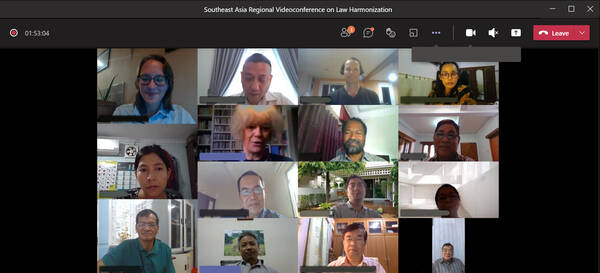Other articles
Cameroon launches its national roadmap towards a national land policy
Promoting responsible and inclusive land governance through MSP in Sierra Leone
Sierra Leone embraces a Human Rights Based approach to land governance assessment
FAO and Partners advancing Inclusive Land reforms at the 2023 African Land Policy Conference
FAO supported the National Forum on Land Tenure in Cotonou
FAO supports the launch of the Pacific Land Network (PLaNet)
Chad validates its National Land Policy
Towards an inclusive land reform in Mauritania
More secure land tenure in Senegal lays the groundwork for agroecology and women empowerment
FAO supports a historic land tenure forum in Guinea
Land Tenure and Sustainable Agri-Food Systems
Open Tenure Trainings with UN-REDD in RDC and Colombia
Geospatial Information for Digital Transformation conference, 27-29 October, Oslo
Land tenure continues to be major objective of development agenda
Mainstreaming VGGT in revision of 2013 Land Law in Viet Nam for more responsible tenure governance
Passage of long-awaited tenure reform in Niger
Sharing land law knowledge in Southeast Asia
What COVID movement restriction means for nomadic pastoralists in the Sahel
Chinese investments in agricultural land in Africa
Land governance in Colombia's protected areas
ECOWAS embraces the Voluntary Guidelines
Sharing land law knowledge in Southeast Asia

As a follow-up to the FAO/Landesa international study visit for government officials of the Government of Myanmar to Viet Nam in April 2019 and several follow-on workshops held in 2019-2020, Landesa Myanmar conducted a study on the complex matter of how to harmonize land laws for the new National Land Law of Myanmar. Given the current political situation in Myanmar, Landesa and FAO pivoted to take a broader approach to this question by looking at comparative examples and best practices from across the region on how the drafting or revision of a land law can be harmonised with other land-related laws.
To provide an opportunity for practitioners to share their vast knowledge and experience, Landesa and FAO convened a regional video workshop on land law harmonization with colleagues and partners from Cambodia, Indonesia, Myanmar and Viet Nam. Participants exchanged experiences with conflicting legal instruments, approaches for harmonizing laws, and inclusive practices for consulting civil society at different stages in the process.
The discussion was lively, with participants sharing challenges and comparing solutions across countries, often finding similarities in the biggest barriers to achieving harmonized legal frameworks. For instance, the importance of identifying a priori potential conflicts between laws and to identify practical solutions when such conflicts occur. Participants requested that the video workshop become a regular gathering to discuss these questions in more depth, and to address other challenges facing land rights in the region. The findings of the video webinar will feed into the study on law harmonisation.

